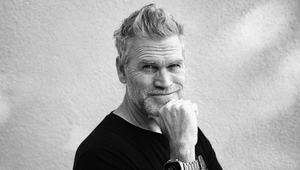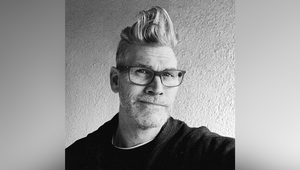
Bossing It: Leading By Example with Oliver Lief

Oliver Lief’s television work as an editor has won three Emmy Awards, six Emmy Nominations, an Alfred I. duPont Award and an A.C.E. Eddie Nomination. He is a member of American Cinema Editors. He has cut numerous television series and documentaries for clients including HBO, Hulu, Showtime, CNN, PBS, and many other networks and cuts commercials for agencies worldwide.
In 2016, he founded Blue Table Post, a full service post house in Brooklyn, with a vision to be a creative sanctuary where filmmakers working in different genres could meet and collaborate.
Blue Table's projects have ranged from award-winning feature films, issue driven documentaries, television series, non-profit shorts and commercial work. The Blue Table art gallery and garden is a meeting place where the idea for someone's next project might germinate. Blue Table's motto is “collaborate beautifully” and aspires to be a home base for filmmakers for years to come.
LBB> What was your first experience of leadership?
Oliver> We often think of leadership in the context of work and what we call “leadership positions”, but I think of leadership as much broader than that – of encouraging and supporting those around us to do the best they can.
As an editor, I led assistant editors, and I sometimes led a team of editors on a series, but I also tried to lead my creative partners. Editing involves a combination of listening very carefully and advancing what serves your vision as well as the vision of the director, producer or showrunner. It's not traditionally considered leadership when you aren't the boss, but it still is.
Being a parent is an enormous leadership experience that is ongoing. I mean, leading a young child out the door to get somewhere can be the most challenging part of a day. The difference now as an owner of a company is that people look to me as a leader, but my job is mostly still to support and provide a framework and the necessary ingredients so that everyone on the team can thrive and do the best work they can, not only for clients, but to help each other.
LBB> How did you figure out what kind of leader you wanted to be – or what kind of leader you didn’t want to be?
Oliver> I learned by observing leaders and feeling how I wanted to be treated by them. We all know leaders who believe leadership is to exert control for the purpose of feeding their ego.
These aren't leaders, they're tyrants. And I knew that I didn't want to be around people like that. So why would I want to be that kind of leader? It's important to keep these people out of your organisation because narcissism is the opposite of leadership and undermines a healthy work culture. A leader's job is to motivate, support and be responsible for a healthy work culture.
It's also to guide an efficient decision making process, provide clarity and help facilitate good communication. It is definitely not to boss people around so you can feel important.
LBB> What experience or moment gave you your biggest lesson in leadership?
Oliver> It is truly a daily process, and it's mostly by recognising mistakes that we grow as leaders and by trying new approaches that work well. Big lessons are often mythologised, but I think most lessons are learned in many small moments – it's by repetition and attentiveness that we grow.
So I can't pick one specific moment, but I'm sometimes struck that when I back up someone on my team in a way that I think is natural and unremarkable, that those moments seems to stick with them, they remember that I have their back. So those moments are lessons about what works, that a leader that has your back is motivating.
LBB> Did you know you always wanted to take on a leadership role? If so how did you work towards it and if not, when did you start realising that you had it in you?
Oliver> No, I didn't. Working as an editor, I began to realise that I had leadership strengths.
In running a company, I could see that I could lead, but that I also had to practice every day at getting better at it.
LBB> When it comes to 'leadership' as a skill, how much do you think is a natural part of personality, how much can be taught and learned?
Oliver> It can definitely be learned. Most people have the ability to lead in some capacity. You can do it!
LBB> What are the aspects of leadership that you find most personally challenging? And how do you work through them?
Oliver> It's crucial to hire the right people and then encourage and support them, but inevitably you make mistakes. It's important to not wait too long in dealing with a bad fit. Being better at hiring and learning when to let someone go is a big challenge. It's a continual learning process.
LBB> Have you ever felt like you've failed whilst in charge? How did you address the issue and what did you learn from it?
Oliver> Failure in leadership, just like failure in parenting is part of the deal. What I learned is that it's really important to take time to focus on what happened and how to improve in the future, both in the moment and in a broad systemic sense. It almost always come down to clarity of communication and direction. When I have failed to set clear boundaries and expectations with clients, that can hurt our team. So in dealing with both clients and team members, it's almost impossible to be too clear. Clarity is king.
LBB> In terms of leadership and openness, what’s your approach there? Do you think it’s important to be transparent as possible in the service of being authentic? Or is there a value in being careful and considered?
Oliver> It is very possible, in fact important to be transparent, careful and considered. I mean, there is a limit to transparency, so I need to make sure that the transparency is helpful and productive.
LBB> As you developed your leadership skills did you have a mentor, if so who were/are they and what have you learned? And on the flip side, do you mentor any aspiring leaders and how do you approach that relationship?
Oliver> I can't say that I've had one key mentor, but have definitely learned from seeing what leaders do that works and doesn't work. Most of what good leaders do is to communicate effectively.
It's a skill that can be learned and as I learn I try to share it with others by example.
LBB> In continually changing market circumstances, how do you cope with the responsibility of leading a team through difficult waters?
Oliver> I try to stay positive and constructive while listening, empathising and strategising.
Fear of short term obstacles can cause paralysis in dealing with longer term challenges.
It's important to be flexible.
LBB> As a leader, what are some of the ways in which you’ve prioritised diversity and inclusion within your workforce?
Oliver> It's important to think of diversity as critical in enriching the culture and flexibility of the company. Beyond our hiring decisions, we want people from all backgrounds and walks of life to feel welcomed at our events so we can build and grow our community. Creative collaboration is much more innovative when a multiplicity of viewpoints and backgrounds are embraced.
LBB> How important is your company culture to the success of your business? And how have you managed to keep it alive with increases in remote and hybrid working patterns?
Oliver> The company culture is crucial and fundamental to the success of the business. It isn't a flourish. And how we communicate and interact is everything. It is the business. Having a lot of in-person time is very important, even if we Zoom and talk on the phone a lot with remote team members.
We have a lot of events, art openings in our gallery, happy hours, parties and panels, so we encourage as many people to come as possible, just to hang out with each other and also get to know clients and other people in our community, not only people who work at Blue Table, but other filmmakers, artists and neighbours. A big part of our mission is offering a space and community where people can meet each other, get to know each other and sometimes build new working relationships.
LBB> What are the most useful resources you’ve found to help you along your leadership journey?
Oliver> Other people. Just pay very careful attention.













